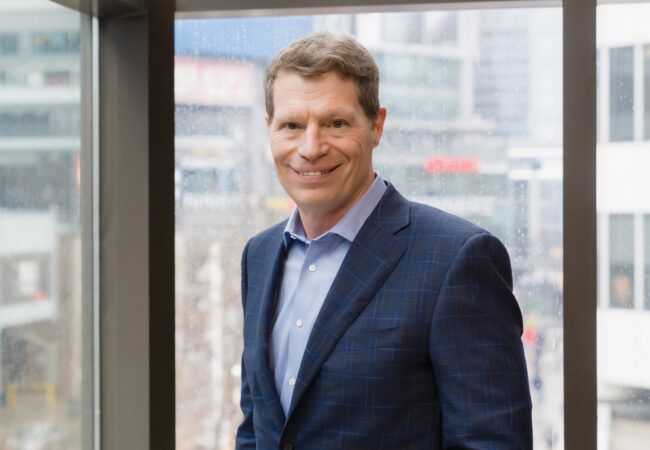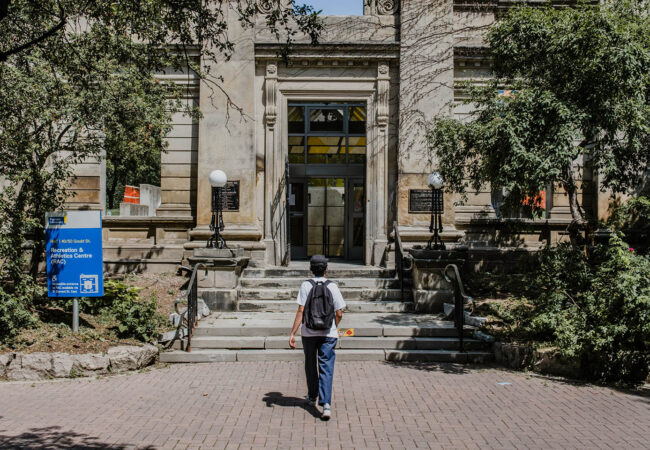We need not look far to understand why so many people are struggling today.
The triggers are everywhere: economic forecasts hinting at recession, climate change altering our landscapes, political systems fracturing across continents. We consume news through platforms that deepen our divisions
Jean Tsai, a counsellor and coordinator of community and outreach at the Centre for Student Development and Counselling (CSDC) at Toronto Metropolitan University, sees the many ways these developments are affecting the TMU community.
The CSDC is part of a suite of supports and programs within Student Wellbeing to help students meet these challenges.
Tsai, who was recently recognized with an Alan Shepard EDI award for creating equity-focused supports for students, shares how we can better take care of ourselves and each other in these turbulent times.
How do the current political and economic challenges affect people differently, depending on their own lived experiences?
We have been seeing a rise in social anxiety coupled with increased loneliness and disconnect. Students identifying as persons of colour will talk about feeling self-conscious or hypervigilant in public spaces. Many are struggling with forming and maintaining meaningful relationships.
International students stand out as being profoundly affected by the current economic pressures. They’re worried about not being able to secure a job and stay in Canada. They feel guilt about the financial pressure on their families, due to the high tuition fees their families are paying, along with the rising cost of food and housing. As a result, they may work 20 or 30 hours a week, on top of studying. They feel like they don’t have much of a margin for error.
We’re also hearing from students who identify as LGBTQ2S+ or have friends or family who are members of the LGBTQ2S+ community. They’re worried about what’s happening south of the border. There’s this feeling that they can’t do much about the attack on people’s rights and the alarming rhetoric, which is really demoralizing.
What advice do you have about supporting someone who may be struggling right now?
Sometimes, when we see people struggling, it can trigger a response within ourselves that’s termed ‘empathic distress.’ This can result in reacting quickly to relieve discomfort. They may offer to show up for someone in ways that aren’t sustainable. So, it’s important to be aware of your own emotional bandwidth and offer help in accordance with that. Aim for quality and consistency over quantity.
The news cycle right now can make some people want to become full-time advocates and others want to tune out the world completely. Both of which might impact mental health. Can you talk about these “fight or flight” responses?
The “fight” response can cause people to become more rigid in their thinking. They might lose opportunities to build connections with others and develop feelings of isolation and burnout. Ideally, we want to harness the “action” energy, but move from a grounded place where we can see the broader picture. It helps to have practices that regulate our physiological responses and our emotions.
Another reaction we commonly see is the “flight” response, where people shut down and avoid acting. Certainly, tuning out can be useful for immediate relief. But over time, feelings that have been pushed aside may suddenly take over. The other risk of this approach is the loss of a sense of agency. What’s more helpful is building those muscles, so to speak, that help us tolerate stress and move forward.
What helps people build resilience to stress and regulate our emotions?
Slowing down and grounding ourselves can help. We can practise noticing our breath in the moment, noticing our feet on the ground. When taking a sip of water, notice that you have clean, readily available water to drink. I recommend taking moments to do this every day. Sometimes, students will tell me this practice didn’t help them, but then they tell me they tried it one time when stress hit hard. If we engage in these practices on a regular basis, they’ll be more effective in those times of stress.
Another important strategy is not going it alone – that’s what the Centre for Student Development and Counselling and other health and well-being supports at TMU are here for. Sometimes, we want to buckle down and do things in isolation, but that’s not a sustainable approach. We need to lean on each other for support, to keep our biases in check, and to not lose sight of a longer-term perspective. I recommend having at least two people you can reliably count on. That way you have a diversity of perspectives and you don’t over-depend on one other person.
Of course, therapy can be a huge help for people too.
Absolutely! Many people can question whether they’re “struggling enough” to access counselling services. Others may have access to free or low-cost counselling through their employment benefits but struggle to make time to utilize these supports. In my experience, people are always glad that they made the time for therapy, even if they need a lighter course of therapy or a quick mental health check-in.
Related stories:






